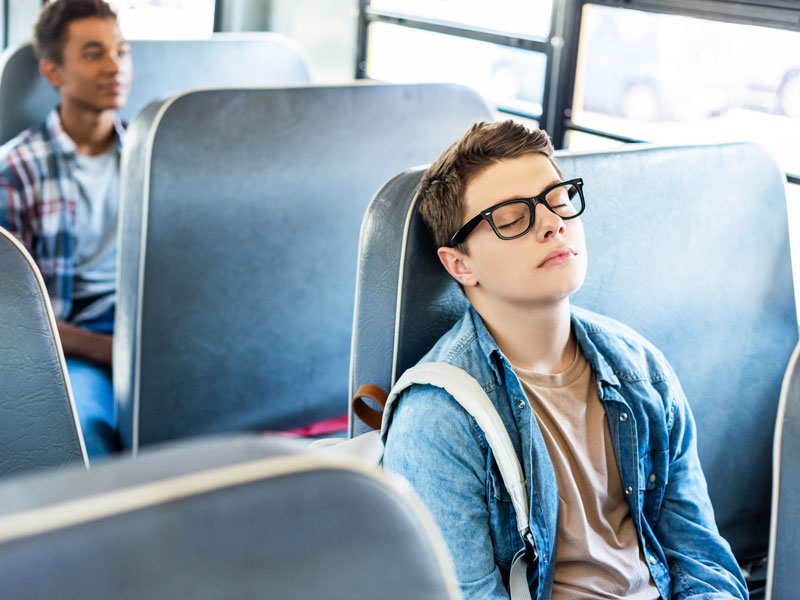The Baby Years are Just one Phase of Sleep Problems for Many Kids
You survive the agonizing, endless years of a baby not sleeping well only to be faced with big kids who have their own set of sleep problems. What gives? Sleep is the most wonderful thing, if you ask any adult. Why do kids have such trouble?
My oldest is a major night owl, and just lies in bed every night till 11 or 12, waiting to fall asleep. She’s been like that since she was a toddler!
My middle schooler still climbs into bed with me multiple times a night because she can’t stay asleep. She’s also been doing this since toddler age.
And my second grader? He doesn’t seem to have any problems, but still wakes me every night between 3 – 5 AM to walk him into the bathroom right next to his room because it’s “too creepy” to go there alone at night.
When will this insanity stop?? I feel badly for my kids who are not getting the healthiest night of rest, and honestly, it’s wearing on me, too.
Sarah Vanhouten, FNP works in the Sleep Medicine Center at University of Michigan Health-West and is no stranger to kids with sleep problems. She has some practical advice on things you can do at home to help your kids get better sleep.
Signs Your Kid May not be Getting Enough Sleep
Does your child show any of these signs? If so, it may be time to address underlying issues with their sleep.
“When a (child) does not get enough sleep on a regular basis we can see… the emergence of mental/physical health concerns,” says VanHouten. “Things such as headaches, hypertension, irritability, trouble concentrating, depression and obesity.
“We know that kids that get enough sleep do better in school, have improved memory, mental health and behavior.”
This totally makes sense, doesn’t it? Us adults have the same exact problems when our sleep is shortened. Only we have coffee. And much more self awareness to get proper sleep whenever we can. Kids need our guidance, though, or else they can crash and burn.
How to Help Kids Fall Asleep and Stay Asleep
While some kids have actual medical issues at play, many children can learn tricks to sleeping well without needing medical intervention.
For starters, is your kid on screens after dinner? Consider cutting that out.
“For many kids trouble falling asleep results from the activities that happen right before bed,” says VanHouten. “To help this we recommend no screen time 1 hour prior to bed (including cell phones, TV, gaming devices, tablets).”
Confession: I’ve been letting my middle schooler read on her tablet in bed, since she’s going to lie awake for several hours anyway. Maybe it’s time to try paper books instead…
These are good tips for anyone trying to rest well, adults included.
Too often we just assume kids must be exhausted from their big days at school and socially, and forget to teach them awareness of these practices.
Anxiety Could be a Sleep Culprit in Today’s Charged World
Ever had trouble sleeping because of worries or anxiety?
Kids experience this, too! Especially now in this very stressful time of COVID and social unrest.
“Our kids may struggle with falling asleep related to worrying about COVID and how it is affecting their friends, family and their school,” says VanHouten. “They may experience more awakenings through the night and struggle falling back to sleep as well.”
Has your child’s sleep problems cropped up in the past two years? It could be linked to COVID.
I have a kid whose sleep problems are 100% anxiety. Hers existed pre-COVID, but the recommendation for helping kids with anxiety and sleep issues is the same: reassurance.
“Giving reassurance and being present to talk through some of their worries is important and can aid in helping them fall and stay asleep at night,” advises VanHouten.
Sleep Issues in Teens – School Start Times and Other Activities Cut Into Natural Sleep Cycle
As kids age, they are forced to bridge the gap between childhood and adulthood. They still have the more extensive sleep requirements of a kid, yet are taking on responsibilities and demands on their time more similar to adults, who require less sleep.
“The teens years are a challenge for many things and sleep is not an exception,” says VanHouten.
The American Academy of Sleep Medicine recommends that kids ages 13-18 should be getting 8-10 hours of sleep a night, yet most teens are only getting 7 hours of sleep!
What is causing this?
Biologically, teenage bodies do want 8-10 hours of sleep, but not at normal times. According to VanHouten, a teen’s biological clock wants to stay up about 2 hours later, and sleep about 2 hours later than normal.
And this doesn’t work in today’s society.
School isn’t designed for later start times, for one. Add in competing gym time/ gym space for athletes, with some even having practice before school starts!
Homework and extracurricular activities after school also push into the sleep time and cause challenges to getting a good night’s sleep for our children.
Sleep Problems for Kids and When to Seek Help
Is your kid doing their best to get enough rest each night, and they’re still having problems? There could be other issues at play.
I developed a narcolepsy in high school. It became really bad in college but when I repeatedly brought it up to my parents, they waved me off. They just thought I wasn’t sleeping enough and had no idea that I could have a neurological problem that was causing me to fall asleep during the day.
We know so much more about sleeping issues today than 20 years ago, and I think one of the best things you can do for your kid with a sleeping problem is to help them get to the bottom of it. Sleep is a very important foundation for all people!
“If your child continues to struggle getting enough sleep or has continued symptoms despite obtaining 8-10 hours of sleep a night … it may be time to be evaluated by a provider,” recommends VanHouten.
Your kid may need a further work up that may include a sleep study (polysomnogram). A sleep study tells providers more of what is happening when your child is asleep, including what kind and quality of sleep they are getting.
I’ve done three of these and it’s so interesting to see what doctors can learn from observing your sleep!
Sleep Related Problems Your Child Could Have
Obstructive Sleep Apnea
OSA is when the airway intermittent collapses or closes, causing the body’s oxygen level to fall and disrupt sleep. When we sleep our muscles relax, including the muscles in the back of the throat that keep our airway open.
In kids, tonsils and adenoids can add to this problem by blocking the airway as well. Signs of sleep apnea include snoring, restless sleep, daytime sleepiness, behavioral concerns, witnessed pauses or gasping and trouble waking in the mornings.
Insomnia
Insomnia is trouble falling or staying asleep. Some health sleep habits to help with insomnia:
Other, Rare Sleep Disorders
While quite rare, there are many sleep disorders that a person could develop, and it’s wise to know about them in case your child develops one. These include narcolepsy, restless leg syndrome, hypersomnia and more.
If you wonder if your child has a sleep disorder that persists even in ideal sleeping conditions, reach out to UM Health-West’s Sleep Medicine Center for a consultation.
When I finally saw a professional about my excessive sleepiness, I was astounded to learn about my narcolepsy. So it wasn’t my fault that I was falling asleep while having conversations with people, while reading, or at work!
And once I learned how to manage my disorder, my quality of life shot right up. I feel like myself again, after decades.
Whether your child has “the average kid” sleeping problems or something medically-related, teaching them how to get proper sleep will help them grow and be the best kid they can be.
University of Michigan Health – West
Multiple locations across West Michigan.
(800) 968-0051


